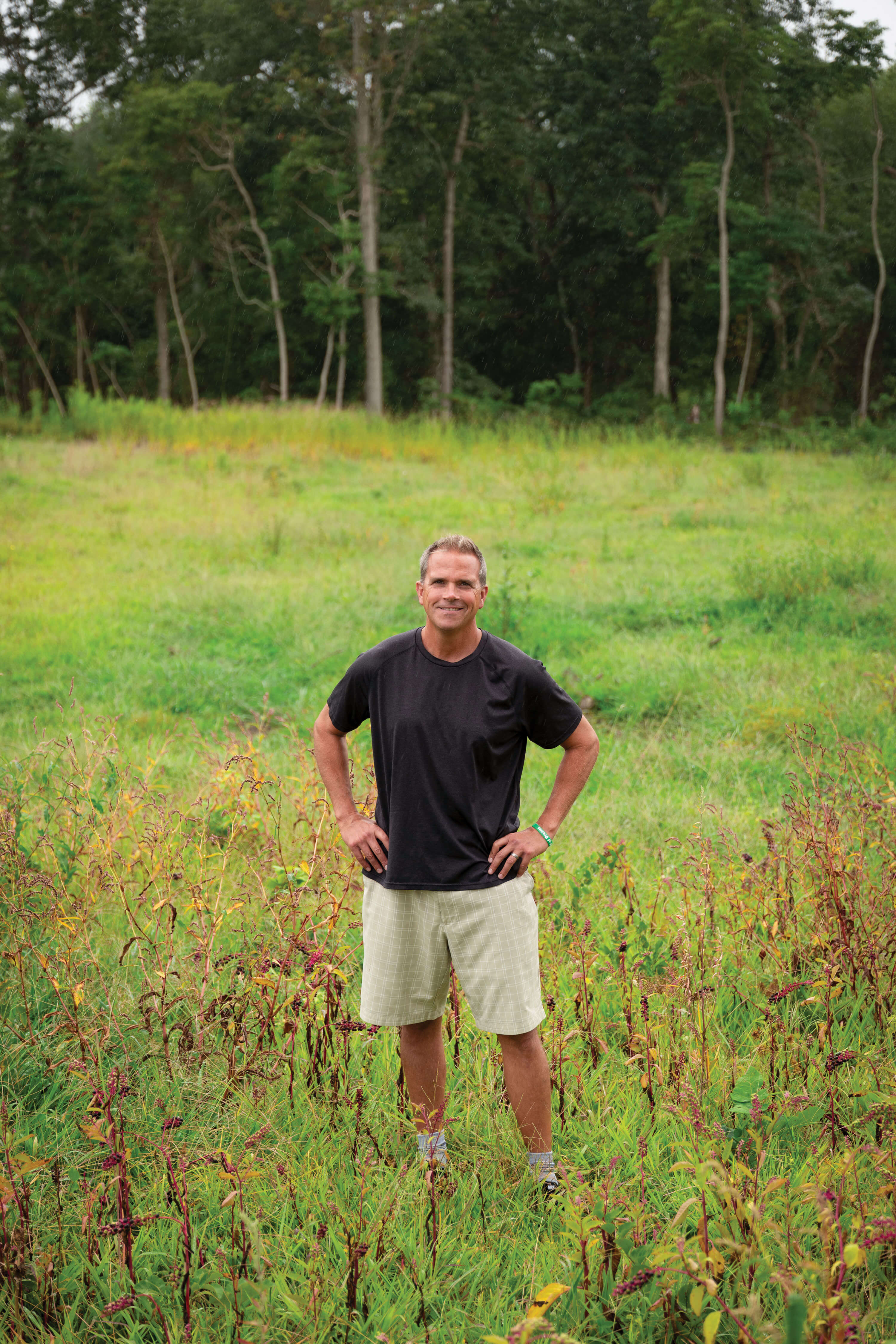
A Fair Field And No Favor
When a tragic accident left his son severely disabled, Christian Kane set out to create a facility where children with special needs can experience the simple joys of childhood. His vision is finally becoming a reality.
There have been constant reminders since the accident of what Mary and Christian Kane ’94 are up against—of the relentless series of challenges that come with parenting a child with a severe disability—but some are more memorable than others.
Perhaps the most impactful reminder came on a spring day two and a half years ago when Mary brought her then-6-year-old son Gavin to an “all-inclusive” playground not far from their home. Trying to lift Gavin into the accessible swing seat, she became aware that other children and parents were watching her struggle. “And she looks up,” Christian says now, painting the scene, “and everyone puts their heads down.” It wasn’t only the playground equipment that was insufficient; it was an environment that ensured they were outcasts.
It was around that time the Kanes decided that they, and Gavin, and every other family facing similar obstacles deserved better than an all-inclusive play ground with little more than, as Christian puts it, “some rubber flooring and a big red chair swing in a corner.” They talked, and they realized that what they needed was a facility that would let children and families thrive—a place, Christian says, “where caretakers can network, and feel typical, and see their loved ones do things they never thought they could do.” And somehow, despite having no experience or training in such things, they decided they’d do it themselves.
Themselves, yes, but hardly alone.
That decision, to create an oasis for children like Gavin and families like theirs, evolved into a mission that is now becoming a reality. This fall, the first phase of the RWJBarnabas Health Field of Dreams at the Ocean Orthopedic Associates Complex is set to open in Toms River, New Jersey, the culmination of countless hours of dreaming and planning by the Kanes, and their almost compulsive insistence on getting help from everywhere and everyone they could. And this is how Christian has spent every spare moment since, asking and pleading and cajoling to get the land, time, and money needed to make the dream come true.
It’s for Gavin. Doing less was never an option.
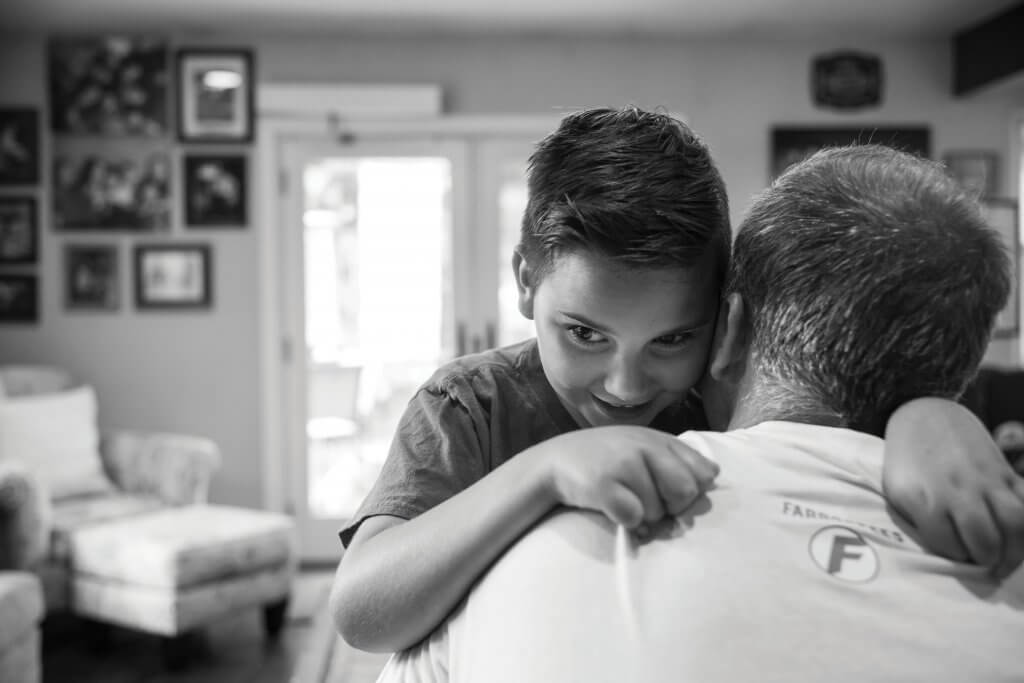
The beer delivery truck was fully loaded when it smashed into the back of Christian’s car on that July day in 2012. Gavin, 19 months old, was in the back seat; when Christian got to his son, he was bleeding heavily and not making a sound. An ambulance arrived quickly, taking Gavin to Community Medical Center, where Christian called Mary, who was then four months pregnant with their sixth child. Gavin’s skull was completely fractured; he’d suffered traumatic brain injury. Doctors told Christian they needed to fly Gavin north to Jersey Shore University Medical Center for emergency surgery to reduce the swelling on his brain and, they hoped, save his life.
They did, and Gavin began a slow recovery, but it wasn’t clear what kind of life he would ever be able to have. He spent the next two months in the hospital, during which time his prognosis became clear: His mind was healthy, but the accident had severed the neural connections that enabled him to control his body. He faced massive limitations. Doctors told Christian and Mary to look into a facility where Gavin could live. Mary said no. They would bring their son home.
While Christian continued working at Toms River High School North, where he’s been a math teacher for the last 13 years, Mary quit her job to become Gavin’s full-time caregiver. They built an accessible playground next to their home, and Gavin loved it; he recognized his parents, he began to sit up, he smiled. There were trips to an all-inclusive community playground, and as he got older, the Kanes became aware of the ticking clock: Mary, now with a baby daughter in tow, wouldn’t be able to lift Gavin into that swing forever. And then it happened—that frustrating, unforgettable moment in the spring of 2017, and the Kanes’ mission came into focus.
At first, it was going to be an all-inclusive baseball field—hence the name—but the idea quickly evolved and expanded into an entire complex with a ball field; an accessible playground; a walking path with rehabilitative stations; courts for basketball, bocce, and shuffleboard; a snack bar; and a pavilion. There will be accessible sports leagues, concerts and other special events, and volunteer opportunities for local students. And running through it all is a sense, intangible but invaluable, that this is a place where, as Christian puts it, “Caregivers can go and sit on a bench and know that the person on the left or right of them is in the same boat. Nobody’s going to be staring at you.” To the best of the Kanes’ knowledge, there is no other complex like it in the country.
There was no doubting the beauty of the concept, no questioning the need. The only question was how to accomplish it. A lifetime of teaching and coaching had taught Christian how to pull the best out of people, but not how to pull money and resources from companies and municipal governments. He knew he had one thing going for him: a story. He would tell it to whomever would listen.

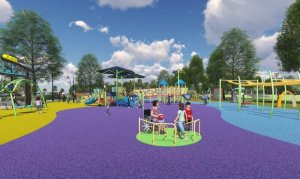
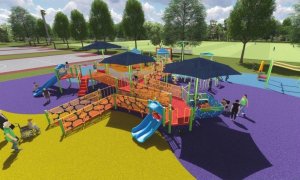
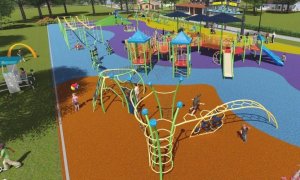
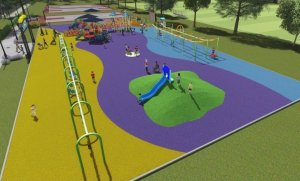
Renderings courtesy of Christian Kane
He started with Toms River Township, banking on that story, and on his reputation as a well-known educator in town. Before anything else, he needed land, and he says the town was “open to it right away—when I told them it was going to cost zero dollars,” he says with a laugh. “They were very receptive to that.” The township promised 3.1 acres at Bey Lea Park.
In retrospect, that was the easy part. Raising a little more than $2 million would require a bit more effort.
And so, even as he maintained his full-time teaching gig, Christian dove into the task, eventually finding three engineering and construction firms that were willing to take on the job— in the end, donating nearly $1 million worth of time, labor, and equipment. The rest of the money has come in chunks both small and large, drummed up through Christian’s tireless speaking gigs in front of whoever will have him—“every Rotary and Kiwanis, every 55-and-over community,” he says. There have been fundraising events and a GoFundMe page. He’s sold naming rights to nearly everything in the park. (At press time, the Kanes were about $161,000 short of covering the total cost of the project.)
Local corporations have stepped up, too, with Jersey Mike’s among the early adopters. A funny story, that one. “I just Googled what the CEO looked like and where his once was,” says Christian. “Then one day I drive to Manasquan, and no lie, as I’m about to walk into the building, he walks out. I say, ‘You don’t know me, but you will in five minutes.’ Well, five turns into 20…” A few days later, Christian had a commitment from the sandwich chain, one of the early commitments that lent credibility to his efforts.
For Mary, it’s all been rather fascinating to watch. “I think this brought something out in him,” she says of her husband. “He’s always been a focused individual, but I don’t think there’s ever been anything like this I’ve seen him chasing, something that he’s so passionate about.”
She doesn’t need to wonder about his motivation. For that, there is a lively, smiling, funny 8-year-old who wants nothing more than to be a normal kid. Gavin won’t be a kid forever, and so Christian has pushed, and his persistence has helped the Field of Dreams come together more quickly than anyone thought possible. “Our foundation board members thought it would take five to seven years,” he says. “I told them, ‘I don’t have time for that.’”
And Gavin? He knows what’s coming, knows his own wait is almost over. He’s seen the site, seen the renderings, heard his parents talk about all that’s gone into bringing this park to life. His excitement fuels everything Christian and Mary have done. “He knows he’s going to meet all these new friends,” says Christian, “and that’s when you see the smile.”